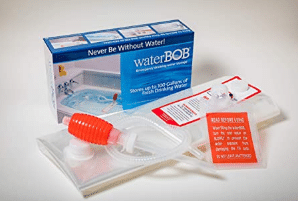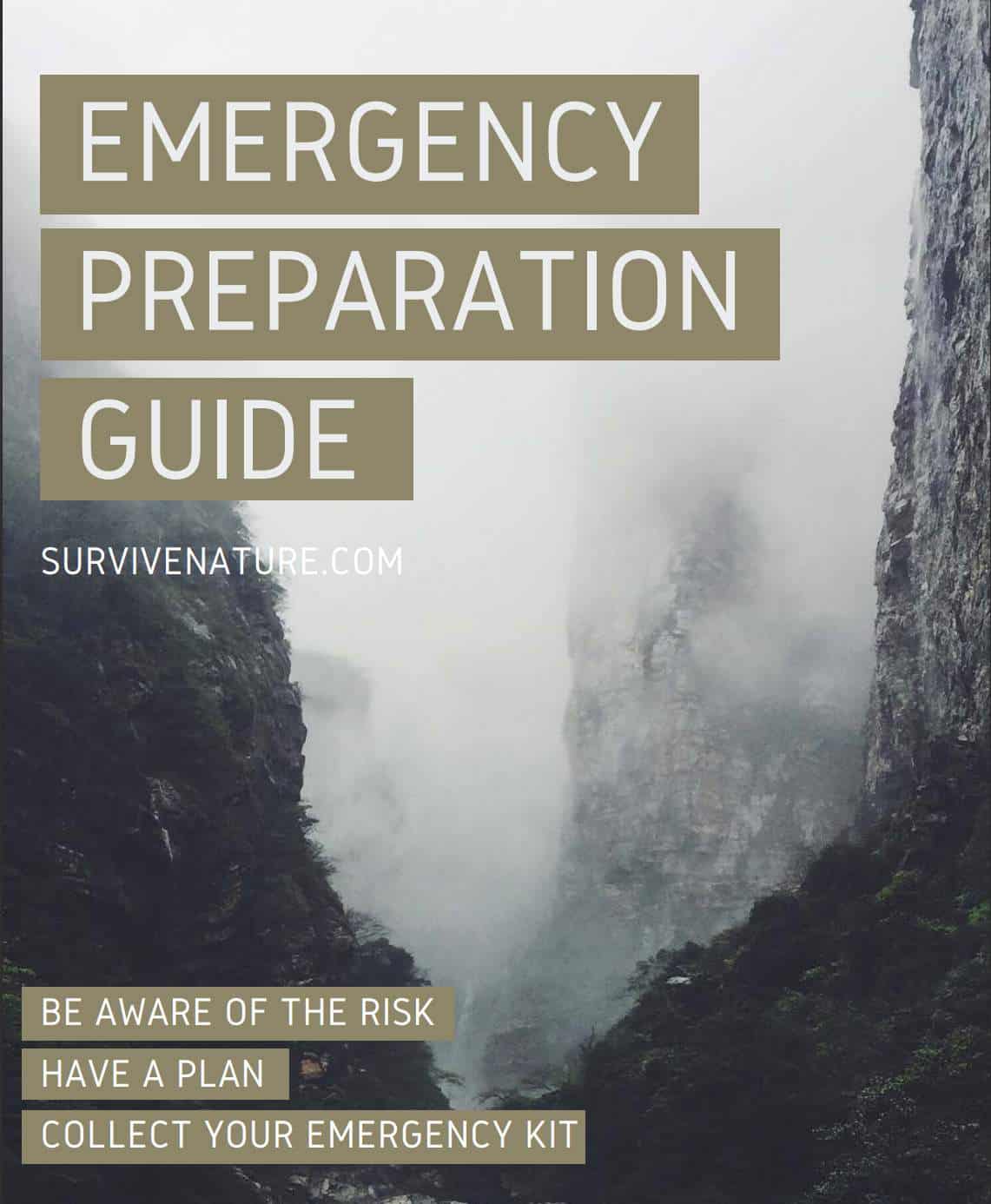Weather is unpredictable, and we, as a prepper team in 2023, should always keep an eye and have our hurricane prep list at our elbow. Understand what you can do before the storm, during the flooding, and after the disaster. Learn how to save your family and pets, what first aid is, how to stay safe from the storm surge, and use the insurance to recover the losses. Preparedness is valuable, and it can save lives.
When you settle down on the coast, you imagine a beautiful ocean, beach, sun, how you will relax under a light breeze. Few people think that a house on the coast is also a hurricane threat. At the same time, the coast of the United States quite often becomes a victim of hurricanes.
We are sure that many of us still remember the destructive forces of hurricanes Rita and Katrina. Then in 2005, many families lost their homes, and hundreds also lost their lives. Some left the coastal areas and never returned. The fear of losing everything again due to a hurricane is too strong.
You can live for many years in one place, build your wonderful house, buy beautiful furniture, have children, pets, a nice lawn. And then, at one moment, everything will be destroyed by a majestic natural element, a hurricane.
Hurricanes are not going anywhere. As they were in 2005, 2012, and will be back again. And it is up to us whether to prepare for them or to lose everything again.
When you live in the Gulf area, you know that there is a hurricane danger, which is very serious. But the human brain is designed in such a way that it perceives this as a mythical danger that can happen somewhere, but not in their house.
And that is a big mistake. After all, if people had prepared sufficiently, many victims could definitely have been avoided.
We need to learn from our own or someone else’s mistakes, so we believe that it is necessary to draw up a hurricane preparation list now. You will save yourself from danger, and at the right time, you will be able to respond clearly and skillfully. The elements will not take you by surprise. You will be on the look-out.
Hurricane Basics
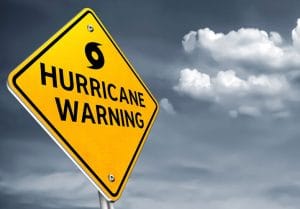
Before moving on to preparing the hurricane checklist, you need to understand what a hurricane is and how it works.
First, a little etymology. Although there is a whole classification of storms, hurricanes, cyclones, for convenience, we will call all “hurricane.”
In English, the “hurricane” came from the indigenous people of the Caribbean, who called the god of evil with this word.
In this article, we will focus on the Atlantic Coast and the Gulf of Mexico. But all our recommendations are suitable for any area. You only need to check the classification schemes and storm seasons that are relevant for your particular area.
Hurricane Categories
To understand how strong the hurricane is approaching or is already acting, it is agreed to use the Safir Simpson scale.
The numbers reflected in the classification show a constant wind speed. Various stronger gusts are not taken into account.
Hurricane
- Category 5: Winds above 157mph
- Category 4: 130 to 156mph Winds
- Category 3: 111 to 129mph Winds
- Category 2: 96 to 110mph Winds
- Category 1: 74 to 95mph Winds
Tropical Storm
- Winds below 74mph
But it looks just like numbers. To understand the difference between such hurricanes, we suggest you watch this video:
Hurricane Features
Warm, humid air fuels the storm system and creates hurricanes, tropical storms. Their principle of operation is the same, but due to some features, they are separated into different categories.
Hurricane Force Winds
The speed of a hurricane depends on its proximity to the eye of the hurricane—the further from the eye, the slower the speed. For example, if the wind near the eye of a hurricane reaches the 4th category, it will be from the 1st to the 3rd one in the rest of the area.
Hurricane Eye And Eyewall
What is a hurricane eye? This is a deceptively calm area in the heart of the hurricane. It is formed due to the rotation of the storm around it and has a strong updraft. There is practically no wind here; it even happens that the sun and blue sky are visible. But this center is surrounded by real walls made of strong winds and clouds. If you move just a little from the eye of a hurricane, you will find yourself in the strongest raging wind.
Scientists measure the strength of the wind just near the eyes of the hurricane and use it for classification.
To better understand the specifics of this phenomenon, you should watch this spectacular video:
Storm Surge
Unfortunately, a hurricane is dangerous not only with the destructive wind but also with another “gift” — a flood. Sometimes people receive this gift before the hurricane itself reaches the coast.
Flooding occurs because the wind creates the effect of water accumulation. The wind collects water in one place, and it seems to spill out of a bowl overcoming the shore, dams, and any obstacles.
Floods make the process of evacuating problem areas almost impossible, or at least very difficult. Floods especially affect low-lying areas. They flood roads, destroy houses.
Watch a video showing the action of storm surges.
Outer Bands
The troubles caused by the hurricane do not end there. If you look at the hurricane from above, you will see that long spirals, the so-called “fingers,” are diverging from the eye of the hurricane.
These outer bands can stretch for hundreds of miles producing localized torrential rains, tornadoes, and floods.
Such an outer band can rain up to several feet in one area. For example, Hurricane Harvey flooded Houston in Texas. The whole city was flooded.
Hurricane Season
There is no clear distinction between the season when hurricanes can occur and when not. Most often, they happen at the end of summer, but this does not mean that they cannot occur in another period.
At the end of summer, a hurricane is most likely due to the very principle by which it is formed. Moisture that rises upward in warm air masses forms rotating storms. In late summer, the southeastern United States has a lot of such moisture due to high temperatures.
Hurricanes reaching the US mainland form in the tropical Atlantic. They then encounter the Gulf Stream, which increases their energy.
In the southeast area, hurricane season can begin in late May and continue through November.
Hurricane Predictions
It is worth knowing 3 concepts to understand hurricane predictions correctly.
1. Cone of Uncertainty
This concept shows the most likely forecasts about where and when the hurricane will move. Scientists use statistics and models of storm formation to predict the most likely course of events.
A hurricane forecast for a shorter period will be most accurate. Therefore, the closer the forecast is to the current location, the less uncertain it is.
2. Hurricane Watch
When you hear about hurricane watches, you should understand that a hurricane can overtake in the next 48 hours and be prepared for it:
- Follow the local weather report;
- Review your hurricane checklist; whether everything is ready;
- Be prepared for the fact that you will have to act in the very near future.
3. Hurricane Warning
If hurricane watch has changed to a hurricane warning, then within the next 36 hours, your area may be overtaken by a hurricane.
What needs to be done at this stage:
- Complete your preparations for an emergency;
- Prepare for evacuation.
This is where we end our introductory tutorial and moves on to hurricane tips and action plans. To get started, we suggest you watch a video on how to survive a hurricane.
How To Prepare Before Hurricane Season
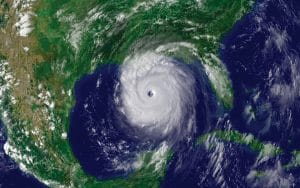
The most important thing you can do to survive a hurricane is to prepare in advance. It is too late to do something if the wind is already raging outside the window. Therefore, it is necessary to think over a plan of action in advance, to stock up on everything you need. Not only resilient life but also life in principle depends on how carefully you have thought of everything.
Do not let things go by themselves, but take the task into your own hands.
Protect Your Home
Strengthen the home and, if possible, get rid of anything that might pose a threat. For example, a tall tree in a backyard can fall straight onto the roof of your house. Hanging flower pots will fly through the window. Think about how you can reduce this harm.
Protect your windows and doors. Add plywood covers and metal shutters to increase their ability to resist wind and protect from objects flying through them.
Stock Up On Non-Perishable Supplies
“In advance” is one of the most important words in preparing for an emergency. The stock of necessary survival items must also be made in advance.
First, you may not have time to buy anything. Remember the pictures with miles-long lines to shops and empty shelves. Essentials are swept off the shelves first. Pharmacies, grocery stores, and gas stations will not be able to cope with the increased flow of customers or might be closed altogether.
Second, the prices of the goods can rise sharply due to the increased demand for them. You do not want to pay several times more for the same bottle of water. For example, WaterBob Bathtub Water Storage usually costs around $ 35.
But in 2017, during hurricane season, its cost went up 2.8 times to $ 100. It makes sense to take care of your purchases in advance.
You can easily buy all the non-perishable products you need early, organize their convenient storage to have quick access in case of emergency or evacuation.
Introducing our basic list of emergency supplies:
- Drinking water
- Medical kit and first aid kit (including prescription medication)
- Food (canned foods and freeze-dried foods)
- Clothes and footwear (for evacuation)
- Matches
- Extra batteries
- Toilet paper and sanitation items, hand sanitizer
- Portable hand-crank NOAA weather radio
- Important documents
- Solar lanterns, tactical flashlights, EDC flashlights
- Repair tools (duct tape, screwdrivers, knife, wrench, etc.)
- Ammo cans with ammunition
- Rain gear (plastic sheeting, waterproof storage containers)
- Charger bank for cell phone
Plan Your Evacuation Route
Confusion is what reduces your chances of survival. Confidence in actions, and most importantly, knowledge of what to do, increase them.
Consider a route you can go to in case you have to evacuate. There is no need to wait for someone to suggest a plan of action or a place. You must take fate into your own hands.
Have a clear route. It is even better if you drive through it in advance.
Ask yourself questions:
- How do you get there?
- Can you take pets?
- How long will the journey take?
- Where can you hide along the road?
- Do you have enough fuel?
- Are there any gas stations by the road?
Think over ALL possible scenarios and details.
Get Insurance Policies
Insurance companies will not issue you a policy when a hurricane is on the way. But in advance, you definitely need to insure your house, garage, car, boat, all the expensive property that you own.
Be attentive to your insurance policy, or better, get independent advice before buying. Often insurance agents are tricky when drafting it because it is in their best interest not to pay you.
Please note that insurance policies may cover damage from a hurricane but not cover flood or fire damages caused by the hurricane itself.
It is in your best interest for insurance to cover your losses, so be careful with every detail. It is better to overpay for insurance than to be left without everything after a hurricane.
Inventory Your Property
This advice will help you get the complete benefits from your insurance company. Take inventory of everything in your home.
A great tip in this regard is to make a video. Walk with your smartphone all over the house, filming all TVs, computers, kitchen appliances, opening all drawers, garage, and so on. This video provides insurance proof that you have (or had) these items.
It is also a good idea to document the list of your belongings. Keep a document where the names and models of things will be indicated. List new items as soon as you buy something of value.
Keep this list in a folder with the most important documents, which you can quickly pick up upon evacuation.
How to React When a Hurricane Watch Occurs
When the authorities announce a hurricane watch, there is no need to panic. A hurricane can pass you by. Or maybe not. Therefore, you need to go through your hurricane preparation checklist and make sure that you are ready for any course of events.
You have a little time to finish something and make last-minute preparations.
What do you need to do?
Secure Your Home
Close the windows, reinforce them and the doors, and bring all the items from the yard into the house. Bring the grill into the house and turn off the propane supply.
Cover windows and doors with plywood shutters. Let your pets inside.
Check Your Fuel Reserves
Let us mention the queues at gas stations. Ideally, you already have a personal gas tank, generator, or solar generator.
But in any case, check that you have enough fuel supplies. Maybe add a few more fuel cans. Check that the generator is running at full capacity.
If you have a solar generator, then you know that it does not need any additional fuel, only solar energy. If you do not have one, then we recommend that you consider buying one. It is not as expensive as it used to be, and the benefits for you and the planet are enormous.
Check Your Emergency Supplies
Take another look at our list at the top. Replace something if it is spoiled, and buy additional non-perishable foods. Make sure that you have at least a 5-day supply of non-perishable food and water supplies.
If you have kids, you can buy them delicious food or entertainment items to keep them busy and not too worried during a hurricane or evacuation.
Do not forget your pets. They also need food and water.
Listen To The Weather Predictions
We recommend that you purchase a hand-crank NOAA weather radio.
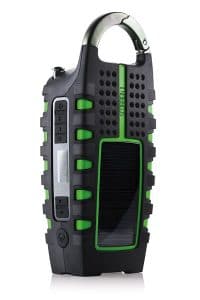
The big advantage of this crank radio is that it does not just run on electricity. If you have not had time to recharge it from the circuit, then you can use the built-in solar panel. But that is not all! The last option is that you can charge it by cranking the handle. The charge will last for a few minutes, but it is better than nothing.
Another huge bonus is that you can charge your phone for a few minutes. That is enough to use emergency phone numbers.
If you have a battery-operated radio, make sure you have extra batteries.
Keep Food Cold
A power outage is very likely. Your refrigerators and freezers will stop working. It is better not to use the refrigerator now and do not open its doors to leave your food stocks in the cold. This will prevent the cold from coming out, and the food will be able to stay unspoiled longer.
Use emergency supplies of non-perishable food and water instead. Therefore, you should replenish its stocks.
How To React When a Hurricane Warning Is Effect
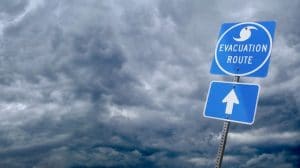
If the authorities have declared a hurricane warning in your area, then there is no time left for big actions. By following the plan, all of your basic preparations should already be made. Only a few details remain.
Disconnect All Appliances
Disconnect gas or water supply if you have to leave your home. It might be worth keeping electricity for the refrigerator.
Review Your Evacuation Route
See if the road is open on your path if there are open alternative routes. You should remember, in principle, how to get to your safe place.
Listen to Weather Predictions
The hurricane situation can change from minute to minute, so do not turn off NOAA weather radio. If the authorities announce an evacuation plan, you will also hear it on the radio.
Load Up Your Vehicle
If you are a skilled prepper, then each of the family members definitely has their own bug out bags. Each bag already contains a disaster supplies kit for everyone.
Transfer all go bags, water, emergency food to the car. Make sure that you have not forgotten documents, and their absence can seriously complicate your life.
Stay Inside
If you stay in the house, you should stay away from windows, even if you have reinforced them.
Even before the hurricane hits your place, strong winds can throw branches or debris through your window.
Evacuate When Needed
If the authorities decide that the local people need to evacuate, we would not argue with them. You may not understand the full danger of a hurricane and not be aware of its strength while the authorities have all the information.
If the hurricane turns out to be less dangerous, you will quickly return to your home. In the event of a hurricane, it is definitely better to play it safe and obey the order.
Staying in your home is the last possible action, your most backup plan, but definitely not the first action.
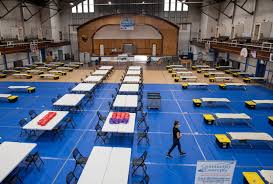
If, for some reason, you have no option to leave, then look for the strongest building near you and take refuge there.
The best strategy would be to obey the authorities and evacuate or get to emergency shelters.
What You Should Do After The Hurricane
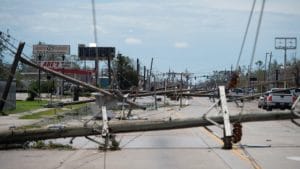
After the storm has passed, you will return back home. You are still alive, and this is the best. Now you will either return to your untouched home or to the rubble.
Although the hurricane is over, it is too early to relax. Remember to take precautions.
Do Not Turn Off The Radio
As we said, the hurricane is just a part of the problem. It could cause severe destruction, flooding, heavy rains. Leave your radio working to keep up with weather changes.
Wait For The Signal
Do not return earlier than it is said by the authorities. They will give you a signal when it is safe to do so.
Drive As Little As Necessary
It will be difficult to return. Roads may still be blocked not only by debris from trees or garbage but also by the authorities. First of all, they need to provide an open road for emergency services and vehicles.
Thoroughly Inspect Your Home
Take your phone and record the state of your home. You should immediately document all damage and destruction to provide evidence to insurance services.
Be extremely careful and do not risk in vain.
Leave The Utilities Off
Be careful with electrical networks, water supply. Wait for a signal from the local authorities that there is no danger in turning on the connections.
If you see any damage, immediately report the appropriate services.
Common Myths About Hurricane
We acquired some delusions thanks to not very well thought-out movies, some we heard from friends or neighbors. In the best case, these misconceptions simply will not bring anything. At worst, they can lead to serious consequences, or you will waste time on meaningless activities.
- You need to open windows or doors to balance the pressure.
For some reason, some people believe that if all doors and windows are boarded up, they will fly out from the pressure. But this is nonsense. Your home is not airtight, no matter how hard you try. Your roof will not fly out because you closed the windows. But the garbage will definitely fly through an open window or worse.
- Tropical storms are not dangerous at all.
If the storm was not given a hurricane classification, it does not mean that there is no cause for concern. Definitely, there are.
Although the wind speed is less, a storm can cause flooding. By statistics, more people suffer from floods than from the destruction caused by the wind.
- Windows should be sealed with duct tape.
Another window-related myth. Someone says that since a layer of thin plastic within the glass is used in cars to protect windows, then this will help in home windows. No, it will not help. Home windows are designed differently, and duct tape will not help.
The window glass shatters into large sharp pieces, which the tape will not hold back.
Better take our advice and cover the windows with thick plywood.
- Do not evacuate until you see the weather turn bad.
First, during a hurricane, the weather changes in minutes.
Second, meteorologists provide the most accurate information to the authorities. If the authorities announce an evacuation, and the sun is shining outside your window, this does not mean that they were mistaken.
Better to grab your emergency supply kit, sleeping bags, first aid kit, family members, pets, and drive to safety.
The sooner you hit the road, the more chances you have to avoid traffic jams. It is unlikely that during a storm, you would like to be in a car, blocked on both sides by people who slow like you.
- You do not need a lot of medications.
There should be a medical and first aid kit in every car. Beyond that, think about medications that you cannot live without.
Do not expect that you can easily buy everything as soon as you return. Like all other services, pharmacies can be disrupted.
Deliveries will be late, and pharmacies will quickly run out of stock. It is better not to take risks but to buy all the necessary medicines counting on a couple of weeks or better a month of use without replenishment. Make sure you have your emergency medication kit ready.
To Sum Up
If you and your family live in an area where hurricanes and storms are possible, then you need to be aware of hurricane preparedness. Do not leave everything to a lucky (or unlucky) chance. Be ready, and then the threat will bypass you.
Panic and lack of a plan are the main enemies of a person in an emergency. Live a resilient life and prepare in advance.
Make your own hurricane preparedness list and start doing point by point. By breaking the task down into small steps, you make it more doable.
We are confident that many losses and damages can be avoided by being aware and acting. Be prepared — keep your loved ones, family, pets safe.
FAQs
How much cash for hurricane prep?
First of all, you must collect a hurricane preparedness kit, which includes non-perishable food and water, a first aid kit, personal hygiene items, extra batteries, hand sanitizer, sleeping bags, charged cell phone, and so on. But also make sure you have cash. Ideally, you should have enough cash to buy food, fuel, and overnight accommodation for several weeks. It is best to have cash in small bills. This will help you when the power is out.
How to prepare for a hurricane with a newborn?
In a family with a newborn, you should have a baby emergency supply kit ready to go. If you collect in a hurry, you may forget something important.
Take drinking water (one gallon of water per day), baby food items. Make sure you have enough diapers, sanitation items, paper towels or toilet paper, and moist towelettes. You also may need plastic bags to collect used personal hygiene items. Bring extra clothes and blankets. Complete your first aid kit with newborn medications.
What to pack when evacuating for a hurricane?
In hurricane season, it is necessary to have an emergency kit ready. There you must include:
- Non-perishable food items like canned foods (you may also need a manual can opener);
- Drinking water (one gallon per person per day);
- First aid kit and prescribed medicine;
- Sanitation items, moist towelettes, hand sanitizer, paper towels;
- Extra clothes, blankets;
- Portable radio and extra batteries, charger bank for cell phone;
- Important documents;
- Flashlights, waterproof matches;
- Garbage bags.
Have at least a 5 day supply for the whole family and pets. Make a list, so you do not forget anything.
What kind of food to buy during a hurricane?
Hurricane preparedness includes food, water. You may need at least a 5-day supply for each family member, and do not forget about pets.
Sample food items list for hurricane preparedness:
- Canned foods: pasta, beans, vegetables, meats, fruits;
- Water: a gallon per person per day;
- Peanut butter;
- Bread;
- Snacks;
- Pets foods.
Do not forget to take a manual can opener, cutlery, and garbage bags. Put all foods into a waterproof container that is convenient to carry.
How does the government prepare for a hurricane?
The government constantly monitors information from meteorologists in the hurricane season. National Hurricane Center gets up to date information. As soon as the threat becomes real, the government announces the evacuation. By this time, emergency shelters should be ready. All emergency services are mobilized.
Check out the government’s advice on hurricane preparedness and the information on National Hurricane Center and have all emergency phone numbers.
What to do after a hurricane checklist?
Once you have put together your hurricane preparedness list, make sure you have not forgotten anything. It is better to start long before the hurricane season.
Start by purchasing food items. Buy non-perishable food, drinking water supply, hygiene items. You may need to strengthen your home and plan an evacuation route.
Stay tuned for reports from authorities. Start evacuation with your family members and pets as soon as you receive the signal.

